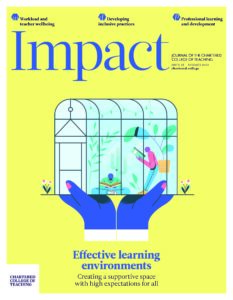In it for the long haul: Building trusting relationships with parents

Jean Gross, independent consultant and author, UK
Nicola Noble, co-headteacher, Surrey Square Primary School, UK; Trustee, Magic Breakfast, UK
Liz Robinson, Co-Director, Big Education, UK; Trustee, National Literacy Trust, UK
A large body of research (Castro et al., 2015) has found substantial associations between students’ attainment and the extent of their parents’ engagement with their learning. John Hattie (2008), for example, estimates that the effect of parental engagement is equivalent to two to three additional years of learning over a pupil’s school career.
Yet surveys find that strategies to increase parental engagement are far from universal. While nine out of 10 school leaders see a lack of parental engagement as a barrier to improving disadvantaged pupils’ performance (National Audit Office, 2015), far fewer – just over half – say that they have interventions in place to address this.
Why the gap between concern and action?
There are two probable reasons for the mismatch between schools’ concerns and action. One is that engaging parents is often hard, uphill work. The second is that the Education Endowment Foundation (EEF) has found little robust evidence in support of specific interventions to involve parents of school-aged children (van Poortvliet et al., 2018).
The lack of evidence, however, may be because successfully engaging parents – particularly those who live in poverty – involves a long-haul approach to building relationships and trust. It is about developing the right school climate, one that promotes parents’ confidence and self-efficacy.
Such long-haul, relationship-based approaches do not lend themselves to evaluation through randomised trials. Instead, we may need to use case studies to illuminate the features of successful practice in high-performing schools serving disadvantaged areas.
Building relationships over time
Haytor View Community Primary School serves a highly disadvantaged community in Devon, but Key Stage 2 progress scores consistently exceed the national average.
Co-headteacher Scott Hampton describes the importance of building families’ trust. Trust is hard to gain and easy to lose, he notes – especially in relationships with those living lives where trust has often been abused or absent.
Leaders at Haytor make sure that they are always out in the playground at the start and end of the day, to greet parents, to ask ‘How was your weekend?’ and ‘to remember what happened the previous weekend – and ask about it’, Scott notes. Trust is based on predictability. ‘If a parent knows that school leaders will be outside every day, not just when they have time, they come to say more than hello to us.’
The process of developing trust starts when families apply for a place in Haytor’s nursery. The Foundation Stage leader telephones every parent and invites them in with the child for an hour-long chat. She puts out play materials and talks to the parent about all the learning that she can see in the child’s play. Parents are then invited to stay-and-play sessions in school.
Right through the Foundation Stage, all parents come in and play with their child at the start of the day. Staff meet six families every week on a Friday after school, to share details of each child’s learning.
The school took part in an EEF-funded trial of the PEEP Learning Together programme (Miller, Dunne and Smith, 2020), involving 20 weekly one-hour sessions in the nursery. A group of parents met to talk together about a topic – from how language develops to how to support early reading. Two years on, the parents in that group still engage actively with all that the school has to offer.
Haytor View operates a flexible start to the school day, with doors opening at 8.35am and the register taken at 8.50am. In Key Stage 1 and 2, this provides a window when children and parents can be in classrooms together, working on ‘time to think’ activities that everyone can undertake and succeed in. Seeing the classroom full of other parents makes those who are less confident feel safe to come in.
Providing practical support
Surrey Square Primary in Southwark serves a highly disadvantaged, diverse community with over 25 languages spoken. Many families live in desperate poverty but have no recourse to public funds. The percentage of pupils meeting the expected standard in reading, writing and maths at the end of Key Stage 2 has consistently exceeded national averages.
Co-headteacher Nicola Noble strongly believes that the school should play a part in ensuring that families’ basic needs are met if children are to learn. To this end, the school supports families to make their case to the authorities about immigration and housing issues. Surrey Square is a designated Safe Space for those suffering from domestic violence. All children receive a free breakfast in school, and staff work with a range of organisations and individuals to support families with basics such as clothing. Regular parent wellbeing surveys go out, and the school employs a Family and Community Coordinator, who is well known in the community for her support for families.
Work with families on understanding the school curriculum and how to help their children learn is carefully planned to meet diverse needs. Data is used to identify groups not engaging with school; this has led to specific sessions in school for Bengali mothers and coffee mornings for Hispanic parents to help them to understand the British education system.
| Building relationships and providing practical support in a secondary school
One secondary teacher had experienced many parents’ evenings that families did not attend. One year, when she found herself with a few free periods in a row, she decided to start a regular two-hour coffee morning for parents, with bacon butties provided. For one session, she invited a local company to come and talk about disability benefits; another was about how to set up an e-mail account. Parents began to support each other, filling in forms, going with each other to hospital appointments, helping with childcare. They also became much more willing to attend regular parents’ evenings, once relationships had been built and barriers broken down (Pinkett and Roberts, 2019). |
Relationships built on respect and empathy
It is easy to interpret a lack of apparent parental support for learning as an indicator of inadequacies in parenting. Schools might criticise, for example, parents who have never taken their children to local places of interest – to the beach, perhaps, even though they live close to the sea. One parent commented, ‘Well it’s not easy… you have to get a bus… we did go once but we didn’t stay because when we got there, there was nothing to do.’
It is worth remembering that this parent had, in all probability, never been taken to a beach as a child, never learned to just mess about with sand and water. People know about trips and reading to children and having conversations with them only to the extent that they have experienced them. The way in which children are brought up transmits itself from generation to generation, and settles in communities.
When parents don’t attend meetings, we might assume that they don’t care about their children or can’t be bothered. But many reasons may prevent them from coming, such as working a second job, lack of the bus fare, lack of confidence or actual fear. When parents did not do well at school themselves, their children’s school can be a scary place (Campbell, 2011).
Understanding these issues is the foundation of work at both Haytor View and Surrey Square. At Haytor, staff always listen to parents with respect and empathy. They treat them as equals and make it clear that Haytor is ‘their’ school. Parents are always welcome in the building. Communications with families are carefully monitored for tone and language – warm, friendly and easy to read. Staff volunteer to read information to parents if it would be useful, rather than wait for them to ask for help.
At Surrey Square, staff understand that parents worry about being judged. Leaders talk to staff about the need to always have a positive conversation with families about their child, before there is a need for a more challenging conversation. All staff take part in coaching training, exploring tools for human interaction – how to build relationships, how to show acceptance of feelings and how to confront difficult issues. Teachers are expected to have at least three positive conversations with parents (face to face or through phone calls) about every child, every term, with systems in place to monitor this. All leaders are out on the playground every morning to talk with parents, and every teacher is out in the playground every day at pick-up time.
The school employs a range of ways of communicating with parents. When one method does not work, they will try others. If emails or newsletters are not going to be read, communication might be through text message, posters on the gate or simply a message on a sticker on a child’s jumper.
Building parental self-efficacy
Research (see Gross, 2021 for a summary) is increasingly demonstrating the importance of students’ self-efficacy (the belief that they can make a difference to their own lives and those of others) for educational success. It would appear that this is equally important in work with parents. One study (Lekfuangfu et al., 2018) found that, holding other factors constant, children whose pregnant mothers ranked in the top 25 per cent of a self-efficacy scale tended to obtain total GCSE scores around 17 pr cent higher than children whose mothers ranked in the bottom 25 per cent.
In practical terms, this suggests approaches to working with parents that empower them to find their own solutions to problems in their lives. This is the approach being taken at Surrey Square. Alongside partners, including Citizens UK, the National Literacy Trust and Sheffield University, the school is creating a virtual Family Zone in the community.
Parents can access courses relevant to their needs (ESOL, literacy and Incredible Years parenting). Citizens UK are providing them with leadership training and there are many volunteering opportunities, which contribute to parents’ sense of belonging and worth and build CVs that help them into employment.
The broader aim of the Family Zone is to tackle residents’ perceptions of community worthlessness, working with them to reimagine how things could be different in the area and to unlock existing but hidden capacity for mutual support.
Making a difference
Research (Social Market Foundation, 2016) suggests that there are key areas where parental engagement makes the most difference to children’s attainment. They are:
- talking with children at home, at all ages
- reading to children in the first five years
- showing an interest in schoolwork
- being in control – feeling able to insist on routines such as homework before screens and regular bedtimes.
In-school events and programmes can be designed to support parents in all of these areas, and many schools have worked with partner organisations to provide them. The issue, however, is take-up. In disadvantaged communities, many families will only engage where there is already a solid basis of relationships and trust on which to build, where efforts have been made to meet parents’ own needs and listen to them with empathy and respect. There are no quick fixes; it is indeed a long haul. But, as the schools described here have demonstrated, it is possible to make a difference.
- Campbell C (2011) How to involve hard-to-reach parents: Encouraging meaningful parental involvement with schools. National College for School L readership. Available at: https://assets.publishing.service.gov.uk/government/uploads/system/uploads/attachment_data/file/340372/how-to-involve-hard-to-reach-parents-summary.pdf (accessed 21 March 2022).
- Castro M, Expósito-Casas E, López-Martín E et al. (2015) Parental involvement on student academic achievement: A meta-analysis. Educational Research Review 14: 33–46.
- Gross J (2021) Reaching the Unseen Children: Practical Strategies for Closing Stubborn Attainment Gaps. London: Routledge.
- Hattie J (2008) Visible Learning. Abingdon: Routledge.
- Lekfuangfu W, Powdthavee N, Warrinnier N et al. (2018) Locus of control and its intergenerational implications for early childhood skill formation. The Economic Journal 128(608): 298–329.
- Miller S, Dunne L, Smith A et al. (2020) Peep Learning Together programme evaluation report. London: Education Endowment Foundation. Available at: https://d2tic4wvo1iusb.cloudfront.net/documents/projects/Peep_Learning_Together_Programme.pdf?v=1630925575 (accessed 24 March 2022).
- National Audit Office (2015) Funding for disadvantaged pupils HC 90. Department for Education. Available at: www.nao.org.uk/wp-content/uploads/2015/06/Funding-for-disadvantaged-pupils.pdf (accessed 21 March 2022).
- Pinkett M and Roberts M (2019) Boys Don’t Try. London: Routledge.
- Social Market Foundation (2016) Family matters: The role of parents in children’s educational attainment. Available at: www.smf.co.uk/wp-content/uploads/2016/11/Social-Market-Foundation-SMF-Family-matters-parental-engagement-and-educational-attainment-November-2016.pdf (accessed 21 March 2022).
- van Poortvliet M, Axford N and Lloyd J (2018) Working with parents to support children’s learning. Education Endowment Foundation. Available at: https://d2tic4wvo1iusb.cloudfront.net/eef-guidance-reports/supporting-parents/EEF_Parental_Engagement_Guidance_Report.pdf?v=1635355222 (accessed 21 March 2022).










